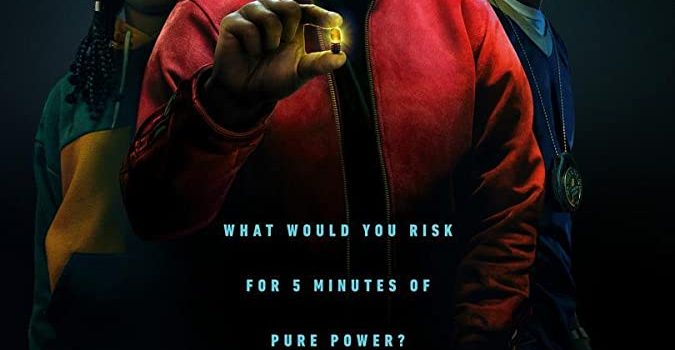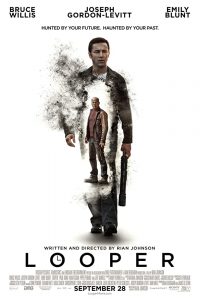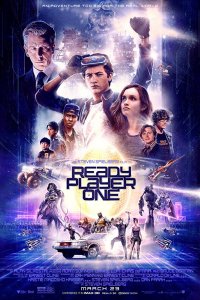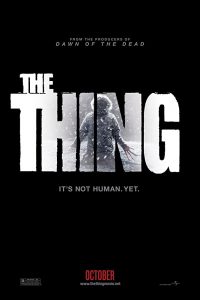Konami Vice: Arley Sorg and Josh Pearce Discuss Project Power
 In the tradition of classics Dirty Harry and Death Wish, Jaime Foxx is Art, an ex-soldier tracking down the people who kidnapped his daughter, using extreme force along the way. The kidnappers are also pushing a drug that grants superhero-like powers for five minutes, and things get complicated when Art runs into Robin (Dominique Fishback), a charismatic but shy teen with big dreams who sells the drug just to get by. Joseph Gordon-Levitt, meanwhile, chases his own narrative as Frank, a cop who walks the line and doesn’t always play by the rules — like Bullitt and Lethal Weapon — even going so far as to take the drug himself. At least, until Captain Craine (Courtney B. Vance) takes his badge and gun and sets Frank on Art’s trail, saying, “He’s your get out of jail free card.”
In the tradition of classics Dirty Harry and Death Wish, Jaime Foxx is Art, an ex-soldier tracking down the people who kidnapped his daughter, using extreme force along the way. The kidnappers are also pushing a drug that grants superhero-like powers for five minutes, and things get complicated when Art runs into Robin (Dominique Fishback), a charismatic but shy teen with big dreams who sells the drug just to get by. Joseph Gordon-Levitt, meanwhile, chases his own narrative as Frank, a cop who walks the line and doesn’t always play by the rules — like Bullitt and Lethal Weapon — even going so far as to take the drug himself. At least, until Captain Craine (Courtney B. Vance) takes his badge and gun and sets Frank on Art’s trail, saying, “He’s your get out of jail free card.”
There is some quality to even the grittiest of superhero crime-fighting movies that telegraphs to the audience hey, this is still comic book stuff: people don’t actually drive high powered tank-cars and dress like bats. Project Power comes from the other side of the spectrum, starting with a fairly standard drug-trade-focused-crime-plus-revenge narrative, like The Wire or the examples above, and adding a dash of superpowers for flavor.
Josh: It was very much like a video game, with the power-ups and different abilities. There was a club called “Screen Arcade” and one character was wearing a “game over” t-shirt. I wondered how much experience the film makers had with game development or video game writing. Checking their credits, the directors and writer don’t appear to have any video game background, so these could just be casual references that don’t mean anything. Though, all three of them are attached to an upcoming Mega Man movie, which is interesting.
Arley: I hadn’t thought about it but you’re right. It does feel more like a video game movie than a comic book movie. The powers are kind of incidental. They don’t matter, they don’t change the plot. You could just as easily give those characters a gun, or you know—
Josh: Except when Joseph Gordon-Levitt is bulletproof.
Arley: Give him body armor!
Any movie goer who is into action has seen this plot plenty of times, albeit with the pleasant variation of three main characters moving along irregularly diverging and intertwining stories. Fifteen years ago, Art and Frank would probably have been bad boy buddy cops who have to save the girl. Despite fairly standard roles, all three actors perform well enough, elevating a movie that might otherwise be banal to… “fairly entertaining.” Effective pops of levity provide needed breaks from violence and heavy themes, vastly improving the film overall.
Josh: I always find JGL really charming, no matter what he’s doing. And he’s playing a stupid, funny guy, which he doesn’t normally do. That was fun to watch. He was so secondary to the actual story for a long time. I was like, he’s just in here to be comic relief. He’s chasing an invisible guy on a bike, which is hilarious, and then he’s running in a towel to stick a duct-taped phone to a van. And then they flash back to the actual story.
Arley: Kind of how you are with Jim from The Office, what we talked about with A Quiet Place, Joseph Gordon-Levitt always gives me Third Rock From the Sun vibes. He will always be that kid for me! Like, I just can’t take him too seriously as “cop walking the line.” I’m like, where’s your alien dad right now?
Josh: I like Jamie Foxx in certain things. Sometimes I think he plays a really weird version of his character. Like in Baby Driver, he was over the top. In this one he was fine, but I didn’t really care about his journey to find his daughter as much as I cared about JGL and Dominique Fishback.
Arley: I really liked her — Robin. She was probably my favorite character. And probably a little less of a template in certain ways. The scene where she gets called out in class is so relatable. She has that mental image of what she wishes would happen—
Josh: That’s exactly what happens in Issa Rae’s Insecure! It’s a really good way to show your reaction to something, but also your realization that you are ultimately powerless in that situation. Then you feel for the character, because you’ve been in that situation.
Arley: It also makes her arc more interesting, because she has development, she comes into her own and stands up for herself. She had great chemistry with Joseph Gordon-Levitt. I had a moment though, in the beginning, because characters like her are often used just to give “cool cred” to the white character who, you know, has this “poor Black friend” they have to save, blah blah blah. Having an arc with development makes their interactions genuine. I didn’t care about Foxx’s arc. But I agree with you, he’s often so over the top. Here he brought it just to the line, he showed restraint and it worked better.
Josh: At one point I thought Robin was kind of a Swiss army knife. She was doing all kinds of stuff that wasn’t set up before. At one point she’s doing stitches, and I thought, how does she know how to do stitches? Then she says, “My mom’s a veterinarian,” and I’m like, okay, I’ll buy it, I guess. A little bit more set up would have been nice, but it doesn’t really break it. It wasn’t beyond believability.
Arley: I think if we were taking this movie, you know, two degrees more seriously, we’d have a long list of things we have problems with.
While Art and Frank are fairly shallow and predictable characters, Robin provides thematic sociopolitical commentary that’s easy to overlook amidst the gunshots, explosions, and people catching on fire. She lives in an underserved community, is verbally bullied by her teacher, and when she tells Art that the only way out of her situation is selling drugs or rap, Art agrees. He does offer one other option: join the military. But his tone is devoid of patriotism. In a tense moment where Foxx embodies the mood of a soldier who has seen terrible things (possibly his best acting in the movie), he essentially conveys the message that some people have it so bad, their only option is to endure those same terrible things he’s endured, and if you survive, reap the benefits after: paid college, medical benefits, and so on. Killing, Art tells Robin, was his skill set. “What the system do, it took advantage of me. But I know now I gotta work the system harder than it’s working me. That’s what you gotta do. You’re young, you’re Black, you’re a woman. The system is designed to swallow you whole.” The focus of the bulk of the movie is still as a “fun action movie” but there’s this added note to it, delivered almost through sleight of hand, saying: by the way, this country’s fucked up.
Arley: I love the scene where she tells him she isn’t going to join the Army, that she’s getting out through rap. And he takes her seriously, which honestly, is important and #ownvoices. He says, all right, then spit bars. How are you gonna do it if you can’t perform in front of people. She spits bars, and he takes a moment, evaluating, and says, yeah. You can do that, you can get out.
Although the powers are secondary and arguably unnecessary — this could just be a movie about drugs — the effects are pretty good. It’s clear that the studio spent a fair amount of money. The pill itself looks cool, and an early scene of New Orleans as a circuit board run through with light builds excitement. The flaming guy is not bad, not awesome, a bit like an expensive video game, but the invisible guy is almost wonderful, and the way he’s utilized in the sequence is actually quite wonderful. The action sequences are generally fair to decent, but you’re never on the edge of your seat, and you’re never quite wowed.
On the other hand, the movie makes the mistake of trying to explain the powers. It’s kind of fun, but the more explanation they give, the more they fall apart. They could have just showed the pill, showed a tank with someone in it, and dropped the word “experiment” and left it at that. The explanations are probably the way the movie most resembles comics: The Hulk happens because of a gamma bomb explosion. No. The Fantastic Four are bombarded with cosmic rays during a flight where they leave Earth’s atmosphere. No. Not at all. This isn’t how radiation works. But we’re fine with it, because at the end of the day, we know people can’t fly anyways, so we allow reality to be smudged early on to get us to the fun bits. Perhaps part of the mistake with Project Power is that the explanations come deeper in the movie, jarring the viewer into disbelief, rather than as an initial ask when you’re first settling in. Sticking to the comic book theme, the bad guys are as predictable and trite as they come, not to mention that they mirror too many recent movies in too many ways, such as The Old Guard and Bloodshot.
Josh: I really liked that this was set in New Orleans. It’s not a very common setting, and it’s an interesting city. After Katrina, all the recovery money was sunk into the French Quarter, casinos, and riverfront touristy areas, while all the local culture and the poor and marginalized populations were ruined or forced out. There’s a really hard class struggle going on. They don’t really touch on any of that in this movie.
Arley: I thought it was pretty entertaining despite the archetypes and clichés. It’s a decent watch, I’d recommend it as a fun crime action movie. Not necessarily for people who are into super hero movies.
Josh: I was entertained when I watched it. Even though Netflix captioned a character speaking Vietnamese as “Speaking Cantonese.” Racist.
Directed by: Henry Joost & Ariel Schulman
Written by: Mattson Tomlin
Starring: Jamie Foxx, Joseph Gordon-Levitt, Dominique Fishback, Rodrigo Santoro, Courtney B. Vance, Amy Landecker, Colson Baker, Tait Fletcher, Allen Maldonado, Andrene Ward-Hammond & Kyanna Simpson

JOSH PEARCE, Assistant Editor, started working at Locus in 2016. He studied creative writing at SFSU and has sold short stories and poems to a variety of speculative fiction magazines. Born and raised in the Bay Area, he currently lives in the East Bay with his wife and sons and spends way too much time on Twitter: @fictionaljosh. One time, Ken Jennings signed his chest.
ARLEY SORG, Associate Editor, grew up in England, Hawaii, and Colorado. He studied Asian Religions at Pitzer College. He lives in Oakland, and usually writes in local coffee shops. A 2014 Odyssey Writing Workshop graduate, he is soldering together a novel, has thrown a few short stories into orbit, and hopes to launch more.
 While you are here, please take a moment to support Locus with a one-time or recurring donation. We rely on reader donations to keep the magazine and site going, and would like to keep the site paywall free, but WE NEED YOUR FINANCIAL SUPPORT to continue quality coverage of the science fiction and fantasy field.
While you are here, please take a moment to support Locus with a one-time or recurring donation. We rely on reader donations to keep the magazine and site going, and would like to keep the site paywall free, but WE NEED YOUR FINANCIAL SUPPORT to continue quality coverage of the science fiction and fantasy field.
©Locus Magazine. Copyrighted material may not be republished without permission of LSFF.








